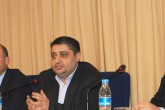In a rather unprecedented cry of outrage, Prince Turki al-Faisal, one of the most prominent figures of the Saudi state, put it bluntly: If the US under the new Obama administration does not change its policy toward Israel and Palestine, the Saudis will no longer maintain their “special relationship” with the US (“Saudi Arabia’s patience is running out,” Financial Times, Jan. 23, 2009). Quoting from the Saudi king that his peace plan, called “the Arab peace initiative,” is still on the table, the prince added that “it would not remain there for long.”
In a rather unprecedented cry of outrage, Prince Turki al-Faisal, one of the most prominent figures of the Saudi state, put it bluntly: If the US under the new Obama administration does not change its policy toward Israel and Palestine, the Saudis will no longer maintain their “special relationship” with the US (“Saudi Arabia’s patience is running out,” Financial Times, Jan. 23, 2009). Quoting from the Saudi king that his peace plan, called “the Arab peace initiative,” is still on the table, the prince added that “it would not remain there for long.”
What is even more interesting is the note al-Faisal takes of Iranian President Mahmoud Ahmadinejad’s acknowledgment of the Saudi king as the “leader of the Arab and Muslim worlds.”
According to al-Faisal, Israel’s bloody war on Gaza has put the “most ardent foes” in the region — i.e., Saudi Arabia and Iran — on the same front. The Saudi prince seems to imply that if the Americans do nothing to stop further Israeli aggression, this “unholy alliance” will grow and change the balance of power in the Middle East.
Is such a change in regional politics likely? Not really. The main reason is the heightened sense of suspicion the Arab states feel toward Iran. And there are two reasons for this. First of all, none of the Sunni Arab states would want to see an ascendancy of Shiite politics in their countries. None of them wants to see what happened in Iraq repeated in other countries. Secondly, Iran’s ambitions to become a regional power house do not sit well in the region.
Currently Iran is using a number of instruments to gain that position. Its nuclear program, its connections with Shiite populations in Sunni states, its confrontational foreign policy toward Israel and the US and, finally, its support of such non-state actors as Hamas and Hezbullah give Iran considerable leverage over the Arab Sunni states, which have been largely tamed by the US-Israeli alliance. While the Iranians seek to normalize their relations with the Arab states and particularly the Saudi kingdom, they won’t succeed until Iran stops using these political tools to open up more space for itself in the region.
None of this, however, is necessarily good news for the new Obama administration. As one can see from the tone of Prince Turki’s piece, the Saudis want the US to change its policy toward the Middle East and stop its unconditional support of Israel. After the recent war on Gaza, the so-called “moderate Arab states” (i.e., those who are always supposed to say yes to Washington and Tel Aviv) have lost all of their credibility. They realize that the failure of their diplomacy will only strengthen more radical movements, which will eventually threaten their own legitimacy and political future. That is why Mousa Abu Marzook, deputy chief of the Hamas political bureau, considers the Gaza war a major political victory for Hamas (“A decisive loss for Israel,” The Guardian, Jan. 22, 2009).
While the Saudi outcry could herald a change in the traditional Saudi line toward the Palestinian issue, it is not clear what the Saudis will be able or willing to do to force this change.
Everybody, including Prince Turki, is listing what the US needs to do but nobody, including Mahmoud Abbas and Hosni Mubarak

